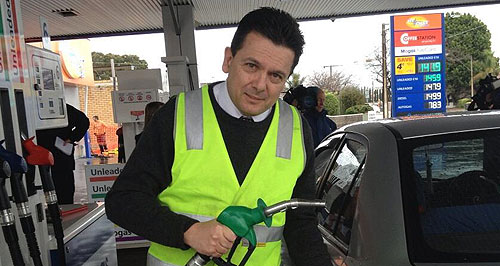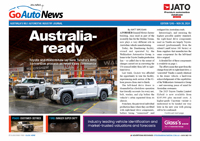Make / Model Search
News - General News - GovernmentSenator proposes punitive bill for fuel fiddlersFuelled up: Senator Nick Xenophon has taken aim at vehicles like Mitsubishi’s Outlander PHEV, claiming car companies are treating its customers like “mugs”. Independent senator to table bill in parliament to punish industry for fuel fails2 Oct 2015 By TIM ROBSON INDEPENDANT senator Nick Xenophon has taken aim at the automotive industry, naming BMW, Jeep and Mitsubishi in a blog on his website as examples of vehicles exceeding stated economy figures. Mr Xenophon used the blog to announce that he would table legalisation in federal parliament, proposing that car-makers change the way fuel economy figures are reported, with “massive fines” of up to $50 million for manufacturers who exceed stated figures. “Media reports this week have indicated that cars including the Jeep Grand Cherokee, Mitsubishi Outlander PHEV 4WD and BMW X4 all burnt between 25 per cent and 133 per cent more fuel than claimed by their manufacturers,” read the statement. “Car companies can use artificial test conditions, including taking out the back seats to make the car lighter or switching off features like air conditioning to make inaccurate fuel economy claims,” said Mr Xenophon. “Testing for fuel economy can be difficult, but the gaps between what is advertised and what is actually achieved on the road really does stretch the credibility gap. “Motorists have been treated like mugs for too long. A family could typically be many hundreds of dollars a year worse off from what they budgeted for because they’ve been misled into buying a particular car.” Mr Xenophon’s information appears to have been sourced from an article in UK consumer publication Which? that claims that 98 per cent of the 200 cars it has tested fail to match claimed fuel economy figures. The bill, which will be released in an early form this month, will propose that the current standard of laboratory-based fuel economy figure reporting be scrapped, and replaced with a ‘typical road use and driving’ standard. As well, it will require car-makers to compensate car owners where there is a “material difference in claimed fuel consumption performance.” Mr Xenophon said that the Global Fuel Economy Initiative (GFEI) – launched in 2009 as a partnership between the United Nations Environment Program and global energy and transport bodies – could be referenced as a starting point for the new legislation. Mercedes-Benz Australia’s senior manager of public relations, product and corporate communications David McCarthy told GoAuto that the company supported the notion of the GFEI, but a more robust and structured debate is required. “The current test is mandated and there is no guarantee that people will achieve it some do and some don’t,” said Mr McCarthy. “The facts are inconvenient when they are used selectively. “We welcome the debate, but simply saying we are misleading the punter is wrong, and threats of fines for publishing a mandated test result that not all can achieve is not helpful. Let's have the debate and then people will know the facts.” BMW Australia provided a statement from BMW AG: “How high real-world emissions actually are depends not only on a driver’s driving style but also on range of other factors, such as temperature, road conditions and fuel quality. In extreme cases this combination of influences can result in significant differences between figures achieved in tests and those recorded out on the road. “In an attempt to close the gap between test and real-world emissions levels, the EU is currently working on a new testing system (WLTP) as well as a Real Driving Emissions test (RDE). We support the swift introduction of new regulations in Europe and beyond to ensure clarity, not only for consumers but also for the automotive industry. “Transport and Environment (European environmental association) suggests that other producers besides the VW Group have also manipulated their cars to meet local test specifications. We categorically deny any such allegations.” Mitsubishi Motors Australia Limited head of corporate communication Shayna Welsh told GoAuto that the company complies with all rules and regulations applicable to the business, including fuel consumption testing. “We welcome any review into ADR (Australian Design Rule) fuel consumption testing, and will comply with any changes to current test procedures,” she said. “In the case of Outlander PHEV, we know of many examples where Outlander PHEV drivers regularly achieve better fuel consumption than the published figures. In fact, Outlander PHEV can actually achieve zero fuel consumption in a drive cycle less than 50 kilometres, depending on battery charge and other factors like driving style and road conditions.” Fiat Chrysler Automobiles Australia declined to comment.  Read more2nd of October 2015  Choice and Mercedes clash over economy figuresMercedes-Benz takes consumer mag to task over 'misinformed' fuel economy story1st of October 2015  ACCC puts more pressure on VW AusConsumer watchdog releases update on so-called Volkswagen 'dieselgate'23rd of September 2015  VW diesel scandal grows to 11 million carsVolkswagen Group diesel emissions scandal spreads to 11 million vehicles worldwide19th of June 2015  Mitsubishi facelifts Outlander PHEVAustralia queues behind Japan, Europe for more efficient Mitsubishi Outlander PHEV |
Click to shareGeneral News articlesResearch General News Motor industry news |











Facebook Twitter Instagram